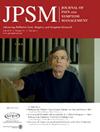盲法和开放标记癌症疲劳治疗试验中安慰剂对疲劳的改善。
IF 3.5
2区 医学
Q2 CLINICAL NEUROLOGY
引用次数: 0
摘要
背景:本研究的目的是比较安慰剂反应,即癌症相关疲劳(CRF)的改善在接受安慰剂的晚期癌症患者队列之间,作为CRF临床试验的一部分,以盲法方式进行,并作为开放标签治疗CRF。材料和方法:本研究回顾了某三级癌症中心随机对照CRF临床治疗试验中接受安慰剂的晚期癌症患者的资料,并采用盲法和开放标签设计。将人口统计学数据、慢性疾病治疗-疲劳功能评估(FACIT-F)和埃德蒙顿症状评估量表(ESAS)评分进行汇总,并比较两个队列从基线到第8天FACIT-F(安慰剂反应)的变化。我们还研究了安慰剂反应与人口统计学因素、FACT-G及其子量表、ESAS症状和ESAS症状痛苦评分的关系。结果:我们发现盲法组和开放标签组安慰剂反应无显著差异[6.6 vs 7.9, -1.3 (P =0.87)]。我们发现安慰剂反应与基线FACIT-F -3.5 (P=0.0001)、胃肠道肿瘤5.2 (P=0.02)、ESAS-疼痛0.70 (P=0.04)、ESAS焦虑1.3 (P=0.003)和ESAS-症状窘迫评分-0.53 (P=0.012)之间存在显著相关性。结论:在本研究中,我们发现在随机对照CRF临床试验中,在盲法和开放标签设计中接受安慰剂的患者之间安慰剂反应无显著差异。在本研究中,我们发现安慰剂反应与基线CRF、胃肠道癌症、ESAS-疼痛、焦虑和ESAS-症状窘迫评分之间存在显著关联。需要进一步的研究。本文章由计算机程序翻译,如有差异,请以英文原文为准。
Improvement of Fatigue Due to Placebo in Blinded and Open Labeled Cancer Fatigue Treatment Trials
Background
The purpose of this study was to compare the placebo response i.e., improvement of cancer-related fatigue (CRF) between cohorts of advanced cancer patients who received placebo as part of CRF clinical trials in a blinded fashion, and as open-label for treatment of CRF.
Materials and Methods
In this study, data of advanced cancer patients from randomized controlled CRF clinical treatment trials who received placebo in a blinded, and as an open labeled design at a tertiary cancer center were reviewed. Demographic data, Functional Assessment of Chronic Illness Therapy-Fatigue (FACIT-F), and Edmonton Symptom Assessment Scale (ESAS) scores were pooled, and changes in FACIT-F (placebo response), from baseline to day eight in the two cohorts were compared. We also examined the association of placebo response with demographics factors, FACT-G, and its sub scales, ESAS symptoms, and ESAS symptom distress scores.
Results
We found no significant differences in placebo response between the blinded and open label cohorts (6.6 vs. 7.9, −1.3 [P = 0.87]). We found significant association between placebo response and baseline FACIT-F -3.5 (P = 0.0001), gastrointestinal cancers 5.2 (P = 0.02), ESAS- pain 0.70 (P = 0.04), ESAS anxiety 1.3 (P = 0.003), and ESAS-Symptom Distress Score −0.53 (P = 0.012).
Conclusions
In this study we found placebo response was not significantly different between patients receiving placebo in a blinded and open-labeled design in randomized controlled CRF clinical trials. In this study we found a significant association between placebo response and baseline CRF, gastrointestinal cancers, ESAS- pain, anxiety and ESAS–Symptom Distress Score. Further research is needed.
求助全文
通过发布文献求助,成功后即可免费获取论文全文。
去求助
来源期刊
CiteScore
8.90
自引率
6.40%
发文量
821
审稿时长
26 days
期刊介绍:
The Journal of Pain and Symptom Management is an internationally respected, peer-reviewed journal and serves an interdisciplinary audience of professionals by providing a forum for the publication of the latest clinical research and best practices related to the relief of illness burden among patients afflicted with serious or life-threatening illness.

 求助内容:
求助内容: 应助结果提醒方式:
应助结果提醒方式:


